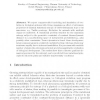Free Online Productivity Tools
i2Speak
i2Symbol
i2OCR
iTex2Img
iWeb2Print
iWeb2Shot
i2Type
iPdf2Split
iPdf2Merge
i2Bopomofo
i2Arabic
i2Style
i2Image
i2PDF
iLatex2Rtf
Sci2ools
EUROCAST
2007
Springer
2007
Springer
Entropy-Based Modeling and Simulation of Evolution in Biological Systems
Abstract. We report computer-aided modeling and simulation of evolution in biological systems with living organisms as effect of extremum properties of classical statistical entropy of Gibbs-Boltzmann type or its associates, e.g. Tsallis q-entropy. Evolution for animals with multiple organs is considered. A variational problem searches for the maximum entropy subject to the geometric constraint of constant thermodynamic distance in a non-Euclidean space of independent probabilities pi, plus possibly other constraints. Tensor dynamics is found. Some developmental processes progress in a relatively undisturbed way, whereas others may terminate rapidly due to inherent instabilities. For processes with variable number of states the extremum principle provides quantitative eveluation of biological development. The results show that a discrete gradient dynamics (governed by the entropy) can be predicted from variational principles for shortest paths and suitable transversality conditions.
Classical Statistical Entropy | Constant Thermodynamic Distance | EUROCAST 2007 | Variational Problem Searches |
Related Content
| Added | 07 Jun 2010 |
| Updated | 07 Jun 2010 |
| Type | Conference |
| Year | 2007 |
| Where | EUROCAST |
| Authors | Stanislaw Sieniutycz |
Comments (0)

